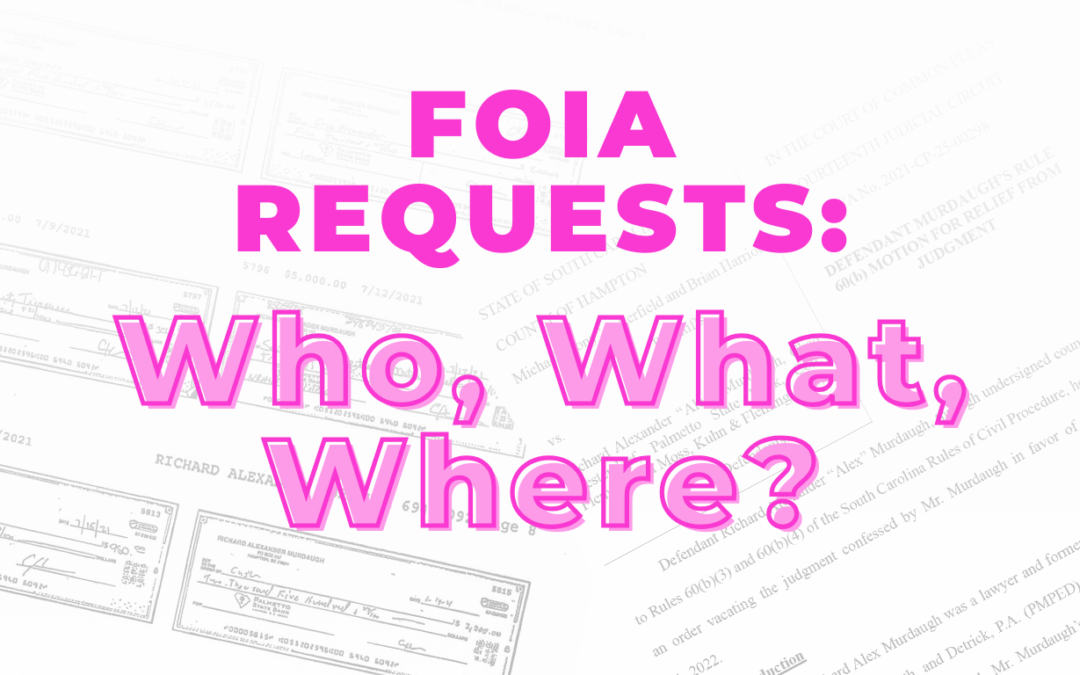When you need information from the government, FOIA and your state’s open records laws are your most important tool.
FOIA is short for Freedom of Information Act, a federal law that ensures citizens have access to government records. Each state also has its own laws on dealing with open records requests. There are some general things that you can bank on when it comes to open records rules in each state:
- The law itself is going to be online somewhere so you can see what is considered a public document.
- There will be exemptions to what is open record. In some states, autopsy results are public record but in other states they are not.
- You may be asked to pay a fee for the time it takes to research and produce the information you’ve requested if it’s old or not readily available.
What is a Public Record?
Broadly speaking, public records are the documents that pertain to government-funded entities. That includes (but is not limited to) things like city council meeting minutes, the school board budget, personnel files for government employees, property ownership and transfers, criminal and civil court filings, emails between county commissioners, and more. Sometimes, these things are readily available online. Other times, you’ll need to submit a request — and that is where making a FOIA request comes in.
6 Steps To Submit Your Own FOIA
Since each state does things a bit differently, you should think of this as a general guide as you get started on your FOIA journey. When filing your own FOIA request, you will need to do the following:
- Identify the right office
- Submit the request
- Keep your own records
- Wait patiently
- Be pesky if you have to
- Pay the fee ASAP
Identify the Right Office
In order to make a successful records request, you have to submit the request to the right office.
For court records, you’ll want to find the Clerk of Court for your county or judicial district. If you want to know about property records, you need to check with the property assessor or register of deeds. Are you curious about the budget at the local school or how much money the school cafeterias is spending? That’s a board of education question.
If you aren’t 100 percent sure who has the record you want, call the office you believe has it and just ask if they are the right office. If it is, ask who to send the request to.
Submit the Request
Once you know which office your request should go to, see if their website already has information on submitting an open records request and follow the instructions exactly. Some entities will deny a request that isn’t formatted or submitted properly, which ultimately delays your process because you have to submit a new request.
Whether you are filling out a blank form or writing your own request from scratch, you will need to describe what records you want as specifically and clearly as possible. Remember to include things like dates and properly spelled names. You may also need to specify how you want to retrieve the records, whether that’s by having them mailed, picking them up in person, or receiving them electronically. Keep in mind that having them mailed will likely cost you more money as paper is heavy, and postage is calculated by weight.
Keep Your Own Records
Keep your own log of when you submitted a request, who you sent it to, when it was acknowledged, and when you expect to get your information. This is especially helpful if you are submitting multiple FOIA requests at a time. You may also consider logging the contact information for the person who is handling the request if you know it. This can help you stay organized and also lets you know if one of the offices you’ve reached out to is out of compliance with state law.
Wait Patiently
Waiting on a request to be fulfilled is the hardest part of filing records requests. In South Carolina, public entities have 10 business days – weekends and holidays don’t count – to acknowledge a request and say whether or not the request can be fulfilled. After the acknowledgement, the entity has 30 business days to fulfill the request — and that number increases to 35 days if you are requesting documents that are more than two years old. You could be waiting a significant amount of time before you see any information back for your request.
Be Pesky (if you have to)
You only need this step if you find yourself in a situation where a public body is out of compliance with the law when it comes to acknowledging or fulfilling a request. When that happens, reach back out to them before you get mad. It might be that your request got lost in somebody’s inbox or somebody is out sick. Assume no malice. If the situation isn’t resolved with a pleasant phone call, then send an email to your contact informing them that you believe they are now out of compliance with state law. If that doesn’t work, include their supervisor on the next email.
If for some reason that still isn’t working, continue up the chain. If you are trying to get records from your own city council, school board, or county commission, go to your representative on that board or include all of the members in your emails. If there is an ombudsman for the county, consider calling them. You may try looping in the county attorney – he or she is on the government payroll but has an interest in making sure everyone is in compliance with the law.
Another avenue of recourse is checking to see if there’s an office of open records counsel in your state.
If you reach a dead end and you absolutely cannot get a public record, you can also consider filing a lawsuit, but it’s probably more cost effective to reach out to a member of the media to see if some more public pressure might help. In Cup of Justice Podcast, episode 35, Mandy talked about what folks can do to get media attention when there’s been a miscarriage of justice.
Pay Any Fees ASAP
You can generally expect to incur some type of charge for the production of records to pay for the time it took the office to find and assemble the documents you asked for. Some offices will send you your requested information and an invoice; other offices won’t give you the records until you submit payment. Some entities will require you to submit payment by mailing a check, so remember that the time it takes to pay can also increase the amount of time it takes to get your records.
When To Share Public Records Online
The Society of Professional Journalists, SPJ, has a lengthy code of ethics it expects journalists to adhere to. One of those guidelines is to “recognize that legal access to information differs from an ethical justification to publish or broadcast.”
There have been many times that Luna Shark has obtained records that were not disseminated to our listeners, which brings us to another SPJ guideline, “Avoid pandering to lurid curiosity, even if others do.”
In April 2023, we received copies of the emails that convicted murderer and admitted swindler Alex Murdaugh was allowed to receive on his prison-issued tablet. We also got a record of his commissary expenditures. We were checking to see who was writing to him and if there were any oddly large contributions to the commissary account. There was nothing unusual about the commissary account and nothing newsworthy in the letters written to him. There were women with an apparent romantic interest writing to him, a few notes from folks who believed he was innocent, and so on. There just wasn’t anything worth reporting on as we also balanced another ethical guideline, “Realize that private people have a greater right to control information about themselves than public figures and others who seek power, influence or attention. Weigh the consequences of publishing or broadcasting personal information.”
These are the kinds of things that we, as journalists, are balancing as we make decisions on what constitutes an ethical disclosure of information. We recognize our platforms have reach and our actions have consequences. Become familiar with the SPJ Code of Ethics as you seek your own documents and contemplate when and how to share them. Examine your motives, use the power of public records for good, and always provide context for what you do share. Never use public records to stalk or harass somebody — beyond being unethical, both of those are criminal acts.

Contact Beth Braden
Beth Braden
Beth Braden is an award-winning journalist with experience covering government, education and crime and courts for more than 10 years. In addition to following breaking news and writing feature stories about life in her home state of Tennessee, her by-line appears on several internationally known websites.
Beth is passionate about communicating complex information in an easy-to-understand manner and she loves to pore over public records and court documents as she seeks out patterns and context to share with her audience. In her spare time, she enjoys quilting, strange museums, and good cups of coffee.
Please sign into your Premium account then refresh this page to view this content.

